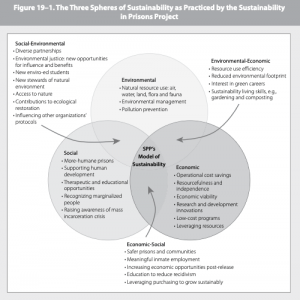The SPP program, as established, strives to reach equity and combat pressing issues such as climate change, mass incarceration, and systemic racism by offering education and science programs in correctional facilities.
On the forefront of bettering the environment, you may see that SPP has already reintroduced two species from extreme endangerment: checkerspot butterflies and Oregon spotted frogs. In the prisons, where the efforts got their roots, the organization has yielded great results from within. Sustainable operations in prisons have resulted in:
-
- Reduced solid waste to landfills by 30%
- Increased diversion to recycling by 90%
- Increased food waste diversion to composting operations by 90%
- Decreased facility heating and energy consumption by 8%
- Reduced all transportation fuel consumption by 25%
- Increased biodiesel use by 9% from 2009-2010
- Reduced total carbon emissions by 40% from 2009-2010
In a larger sense, SPP has reached out and collaborated with organizations from all over the nation, leading to sustainability efforts outside of prisons. Although mostly shut down due to COVID-19, SPP has a track record of the following:
- Helping incarcerated individuals become certified pet trainers and provide future opportunities.
- Give confidence to underwhelmed and idle inmates who don’t know their potential. Many of whom become confident enough to present scientific cases and proceed a work of scientific research upon re-entry.
- Provides common ground between incarcerated individuals and people such as prison guards or others who don’t relate to the plight of an inmate.
The SPP promotes what they call mutual transformation in order to create a path of redemption and healing.

